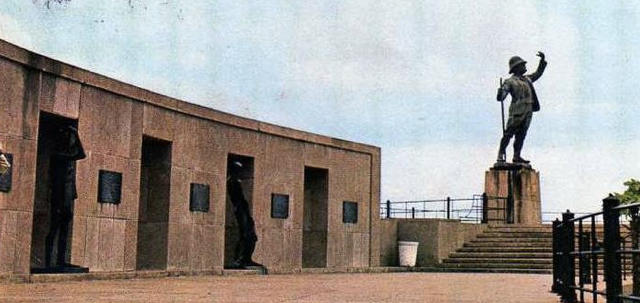
- A tree buds, blooms, leafs, molts, buds
- in a single week.
- Say it right – Ahfrrikah.
- Afternoon sky leaps from blue to black,
- converting air to down-falling river.
- Stops. Goes blue again and steams the ground.
- All in minutes.
- Ahfrrikah.
- Something pointed, acid green,
- breaks ground outside the window
- and moves upward as we watch,
- a coiled tongue, reaching fast
- to lick the sun, straight above,
- over Ahfrrikah.
- Hyacinths mat the river, making islands
- we could walk across to Brazzaville,
- if the crocodiles did not like to idle there,
- black eyes staring up from beneath
- the carpet of foreign blue flowers
- that stop the river's flow,
- invaders who do not belong
- in Ahfrrikah.
- Priests on Vespas sputter along the streets
- their robes and beards flying. Their order
- does not require them to dress up like Jesus.
- But the heathens they were sent to convert
- know how a white holy man should look.
- Their semi-Christians will tell you
- Paul was here, with images of Christ.
- The ancestors carved crucifixes
- you can carbon-date to that time
- if you don't believe them.
- They want to know why we killed our God.
- There is more than you know
- to Ahfrrikah.
- On a high bluff, overlooking the rapids,
- long, lithe bronzes of African bearers
- in loin cloths, their perfect bodies taut with power,
- haul weapons and supplies for the head of the column,
- squat Stanley, pot belly pushing out his khakis,
- his pudgy hand raised to shade blue eyes
- discovering their river.
- As if no one were here
- in Ahfrrikah.
- In the Cité, a totally white being walks among his brown kin,
- a shiver of ice in the sweating heat,
- form and texture, Bantu. Color, none.
- We, the peach-tinted, marvel that he's been allowed to live,
- not smothered as evil, as villagers do an unwanted twin,
- in Ahfrrikah.
- In the Cité, the High Life plays and our foreign bodies
- nod in time, as our hosts become the music,
- moving liquidly within the pulsing laughter of the sound.
- Politely, they do not point at their wooden guests
- in Ahfrrikah.
- A rumor moves through the Cité, gathers force.
- Do not let your sons go to Louvain to study.
- Les Belges tell you they will return, as doctors,
- but they are lying. Here is how they return to us.
- And the tin is passed from hand to horrified hand.
- The one that offers corned beef with a label
- of a laughing young man
- of Ahfrrikah.
- Blacks from America, Returnees, they think,
- stare at facial scarring, at filed teeth,
- at fishermen in piroques casting nets,
- at calabashes moving smoothly on proud heads,
- at round brown bellies that hold future Ahfrrikahns
- protruding from their mothers' jubilant cotton swathing,
- at eyes everywhere that judge these mixed-blood visitors
- in beribboned straw hats and pressed khaki slacks
- to be as foreign as Swedes. This is not Harlem.
- This is Ahfrrikah.
- Down the long slope of
- the hillside, whole villages of
- brown bodies pour towards
- the house. The vice consul at
- the door says Hurry. Grab
- the kids. One suitcase. There's
- no time. In the
- walled compound of
- the consulate, Marines at
- the gates,
- pale faces stare out
- at the swelling river of
- chanting, pulsing bodies
- growing larger, getting louder,
- damming up against the eagled
- walls. In the one suitcase,
- five neckties and
- a bottle of bourbon.
- Washington is sending
- a plane to Brazzaville. Our one
- chance a surprise break for
- the vedette. A chain of
- bodies, men the
- larger beads
- between the
- children and
- the women.
- Don't let go
- of your sister's hand
- or mine,
- no matter what happens.
- We are leaving
- Ahfrrikah.

